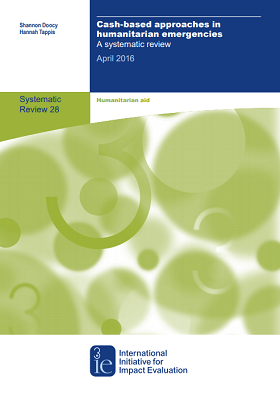Cash-based approaches in humanitarian emergencies A systematic review. April 2016
Humanitarian actors have a responsibility to ensure that assistance is provided in a way that minimizes risks and maximizes benefits to people affected by crisis. However, there are many challenges in evaluating ‘what works’ in addressing the needs of crisis-affected populations, and translating research evidence into practice in complex environments with limited resources.
Humanitarian assistance has traditionally been provided in the form of in-kind goods and services: temporary shelters, food and non-food items, water and medical care. However, as the nature of humanitarian crises has shifted over the last few decades, cash-based approaches have become an increasingly common strategy for the provision of humanitarian assistance and are widely considered an appropriate, and sometimes preferable, substitute for in-kind assistance when conditions permit.
Increasing use of cash-based approaches has been accompanied by efforts to evaluate cash-based interventions and develop recommendations for implementation in a range of settings. Systematic reviews of evidence in humanitarian settings are, however, relatively rare, and, to the best of our knowledge, this is the first systematic review of the effects of cash-based approaches in emergencies to date.



